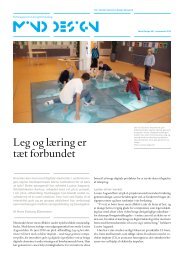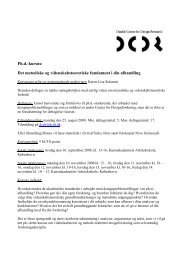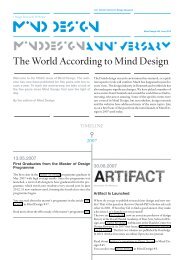- Page 1:
Play-Persona: Modeling Player Behav
- Page 4 and 5:
4.2.3 PLAYER EXPRESSION 53 4.3 PEIR
- Page 7 and 8:
ACKNOWLEDGEMENTS I would like to th
- Page 9:
ABSTRACT This thesis proposes a fra
- Page 12 and 13:
Analysis seeks to break down comple
- Page 14 and 15:
Considering games as acts of commun
- Page 16 and 17:
ensemble - the syntagm. Selection r
- Page 18 and 19:
described in terms of likelihood of
- Page 20 and 21:
ook: FLUX, published in 2008. This
- Page 23 and 24:
2. A THEORETICAL FRAMEWORK FOR MODE
- Page 25 and 26:
“positivism” and “anti-positi
- Page 27 and 28:
with the game world based solely on
- Page 29 and 30:
on that text. Later, Barthes introd
- Page 31 and 32:
according to their mental state. Wh
- Page 33:
Following the humanistic tradition
- Page 36 and 37:
In most games it is not realistic t
- Page 38 and 39:
ehaviour. Assessing assumptions on
- Page 40 and 41:
Independently on the identity of ea
- Page 42 and 43:
main focus of the brand has always
- Page 44 and 45:
3.4 Play-persona as a lens (a poste
- Page 46 and 47:
Figure 10: personality and subperso
- Page 49 and 50:
4. CREATING EXPERIENCES The MDA fra
- Page 51 and 52:
Play-styles are sets of isotopic ga
- Page 53 and 54:
4.2.3 Player expression Player expr
- Page 55:
Players will eventually understand
- Page 58 and 59:
Combining both of these two approac
- Page 61 and 62:
REFERENCES 1. Aarseth, E. (1997): C
- Page 63 and 64:
52. Hunicke, R. LeBlanc, M. & Zubek
- Page 65:
96. Wiggins, A. (2006): Data Driven
- Page 69 and 70:
ARTICLE 1 - TOWARDS A THEORY OF THE
- Page 71 and 72:
flow between the player, the avatar
- Page 73 and 74:
6. The player constructs knowledge
- Page 75 and 76:
are sets of rational, bodily, and b
- Page 77 and 78:
ehaviorism asserting that a compreh
- Page 79 and 80:
4.3 Origin of subpersonalities Acco
- Page 81 and 82:
environment and the emanating subpe
- Page 83 and 84:
flow line), one must increase the c
- Page 85 and 86:
7.1 Explorer’s path FIGURE 5 Expl
- Page 87 and 88:
the roof section, where he/she will
- Page 89 and 90:
14. DE SOUSA, R. 2003. Emotions. In
- Page 91 and 92:
ARTICLE 2 - DESIGNING LEVELS FOR EN
- Page 93 and 94:
2 STRUCTURE OF A GAME LEVEL The fir
- Page 95 and 96:
3.2 Symbolical Reading The movement
- Page 97 and 98:
The hangar is open for workers and
- Page 99 and 100:
gather info, spying through keyhole
- Page 101 and 102:
6.2 Play-Personas I am going to def
- Page 103 and 104:
The Butcher persona would have quit
- Page 105 and 106:
ARTICLE 3 - WAVING EXPERIENCES: PLA
- Page 107 and 108:
types" [12]. Personas are construct
- Page 109 and 110:
esults in the relatively easy task
- Page 111 and 112:
Crew actions schemas are: • Squad
- Page 113 and 114:
choice given until the mark “poli
- Page 115 and 116:
REFERENCES 1. Bozec, P. "My Everyth
- Page 117 and 118:
ARTICLE 4 - WEAVING EXPERIENCES IN
- Page 119 and 120:
In order to be able to take acti
- Page 121 and 122:
persona could be narratively define
- Page 123 and 124:
of non lethal, silent, and clean de
- Page 125 and 126:
ARTICLE 5 - DEFINING PERSONAS IN GA
- Page 127 and 128:
software is however limited in that
- Page 129 and 130:
event sets, i.e. capturing metrical
- Page 131 and 132:
objects and entities within it. Eve
- Page 133 and 134:
metrics include tracking camera vie
- Page 135 and 136:
Figure 4: Example of interaction me
- Page 137 and 138:
looting is a play-style observed in
- Page 139 and 140:
players can choose between differen
- Page 141 and 142:
Play modes: Running, climbing, fall
- Page 143 and 144:
according to their positioning on a
- Page 145 and 146:
14. Medlock, M.C., Wixon, D.; Terra
- Page 147 and 148:
ARTICLE 6 - PLAY-PERSONAS: BEHAVIOU
- Page 149 and 150:
experiences are evaluated and remem
- Page 151 and 152:
B) It is possible to infer user nee
- Page 153 and 154:
personas are hypotheses that emerge
- Page 155 and 156:
Expert Rookie Grunt Athlete Chess-
- Page 157 and 158:
Procedural description: Shooting: -
- Page 159 and 160:
In the case example for Tomb Raider
- Page 161 and 162:
2. Cooper, A.: The Inmates Are Runn
- Page 163 and 164:
ARTICLE 7 - TOWARDS GAMEPLAY ANALYS
- Page 165 and 166:
The requirement for improving user-
- Page 167 and 168:
The literature on game metrics is m
- Page 169 and 170:
ecause they all stem from in-house
- Page 171 and 172:
If a player kills a traitor they re
- Page 173 and 174:
Figure 3 (Top): diagram showing the
- Page 175 and 176:
titles where there is a trend towar
- Page 177 and 178:
a secondary variable together with
- Page 179 and 180:
player spent at the location and wh
- Page 181 and 182:
3. Börner, K., Penumarthy, S.: Soc
- Page 183 and 184:
34. Thompson, C.: Halo 3: How Micro
- Page 185 and 186:
ARTICLE 8 - ANALYZING SPATIAL USER
- Page 187 and 188:
on basic statistical analysis metho
- Page 189 and 190:
visualization or for creating overv
- Page 191 and 192:
egarding actions undertaken in-game
- Page 193 and 194:
ased methods within the games area
- Page 195 and 196:
2.4 The EIDOS Metrics Suite The dat
- Page 197 and 198:
is played in Third-Person perspecti
- Page 199 and 200: one cause of death, and performing
- Page 201 and 202: ArcGIS permits different layers to
- Page 203 and 204: 4. Cadez, I., Heckerman, D., Meek,
- Page 205 and 206: 35. Whiteside, J., Archer, N. P., W
- Page 207 and 208: ARTICLE 9 - PLAYER MODELING USING S
- Page 209 and 210: unsupervised learning in capturing
- Page 211 and 212: 3. TOMB RAIDER: UNDERWORLD The popu
- Page 213 and 214: 2 - Environment; the percent of tot
- Page 215 and 216: (ESOM) [5] to emphasize the distinc
- Page 217 and 218: populated middle-left cluster (Fig.
- Page 219 and 220: weight values we repeat the trainin
- Page 221 and 222: TABLE I THE FOUR PLAYING BEHAVIOR C
- Page 223 and 224: (d) Number of Deaths, D (e) Complet
- Page 225 and 226: equests for specific in-game puzzle
- Page 227 and 228: 13. G. N. Yannakakis and M. Maragou
- Page 229 and 230: ARTICLE 10 - PSYCHOLOGY OF PERSONAL
- Page 231 and 232: Personality is described as recogni
- Page 233 and 234: Inputs: Outputs: Primary attack (ra
- Page 235 and 236: Due to the fact that each game metr
- Page 237 and 238: 12. Jennett, C., Cox, A.L., Cairns,
- Page 239 and 240: ARTICLE 11 - GAME METRICS AND BIOME
- Page 241 and 242: His research interests are biometri
- Page 243 and 244: 5. R. L. Hazlett. Measuring emotion
- Page 245 and 246: ARTICLE 12 - ANALYZING USER BEHAVIO
- Page 247 and 248: elated to player-game interaction a
- Page 249: 10. Kuniavsky, M.: Observing the Us
- Page 253 and 254: Play-personas are here introduced a
- Page 255 and 256: It is only natural that game design
- Page 257 and 258: 4 Defining play-personas using game
- Page 259 and 260: TRU is the eighth installment in th
- Page 261 and 262: gameplay, descriptiveness of player
- Page 263 and 264: In the case of TRU, the three param
- Page 265 and 266: into which sections of the levels t
- Page 267 and 268: Runners: This group completes the g
- Page 269 and 270: 17. Iser, W.: The Implied Reader. J















